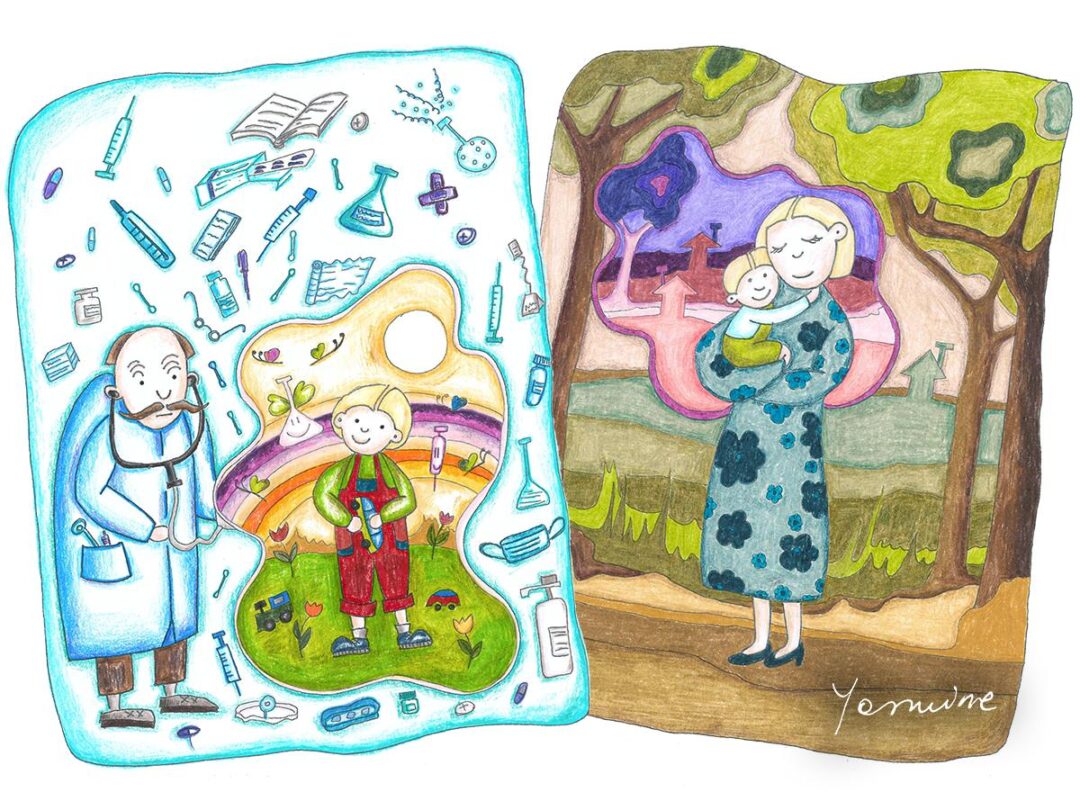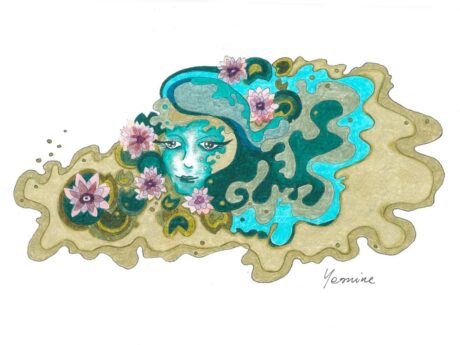Matala was longingly awaiting her second child. The first son, Kabu, a charming smartie, somehow foreshadowed another exemplary childbearing. The first glance, the first smile, the first steps, the first words – it all happened at a impeccable pace. She was watching this in admiration, clasping her hands at every single display of textbook-like development.
And then on the event horizon there appeared Atu. He was welcomed by her curious gaze saying as if: “What colours will you paint my world?” However, in this silent question there was a substantial expectation: a glamorous image in a familiar bright range of colours. Yet Atu had come into this world grasping in his tiny fist an unusual blend of colours, which could not be found in any standard palette. He was avoiding brushes and canvas, ignoring the rules of composition, proportions, perspective or chiaroscuro. He could not comprehend the persuit for precision, and to be frank he did not know where its boundaries were. He would paint with bare hands and even with the whole body. With impetus and without limits. When he did not feel like painting, he did not do it. Atu’s artistic creation flowed with an almost wild expression. He did not succumb to a particular paint, it is the paint which succumed to him. He painted what was with him at the very moment, with no pior planning. He created what he fancied, but that did not always meet the expectations of others.
Matala’s world had known similar cases – children disinterested in painting the same pictures all over again, surpassing the frames of imagination, creating new patterns and new standards of artistic expression. However, people were usually not comfortable with cases like that. Matala’s world enjoyed repetitive, predictable patterns, so it would push away in an almost imperceptible manner those pieces which did not fit the whole. They were placed outside mainstream society or enclosed in a tight medical term. And thus medicine would attach a range of labels to children such as: ‘atypical”, “autistic”, “hyperactive”, “aberrant’ or “disfunctional”. In the eyes of passers-by they looked “unruly”, “misbehaved”, or “fractious”. In teachers’opinion they were labeled as: “undisciplined”, “unsubbordinate”, “rebellious”. In turn acquientencies would perceive them as “different”, “special-needs” or soemtimes “exceptional”. However, in the general reception there was one dominating term that was used – “ill”.
Both press article headlines and specialist’s comments clearly suggested what kind of emotions were triggered when being an outsider:
ILL CHILD IS A BLOW FOR A PARENT,
DISFUNCTIONAL CHILD IS A REALITY WHICH IS HARD TO ACCEPT,
CHILD THAT IS IMPAIRED CREATES PROBLEMS FOR ALL THE FAMILY.
So everywhere they went together outsider children attracted gazes and expressions of disapproval, sneer or even silent laughter. In the bipolar world of Matala, everybody who did not fit the pattern ended up in bag labeled as “ill people”. One could take a break from this for a while or stay there for the rest of your life. You remained there simply because of system-defying behaviour, ideas or health condition.
— It would be much better if you had come here with an instructon manual or even a short note with some tips. – said Matala after having heard another set of advice by medical doctors. They proceeded as usual – just measured Atu with a cold ruler which complied with the system. However, something inside told her that she should follow a different way.
— Atu, what was written in your letter? – she asked her little son who was cuddling and clinging to her as usual. Matala closed her eyes and pictured herself producing a slip of paper from his little fist right after he was born. “Do not look at me with someone else’s eyes. Do not talk about me with someone else’s mouth. Do not listen to what is being said about me. Trust yourself.”
She would hear a mysterious voice in her head. Every time when the system said “no”, the voice whispered: “keep on searching”. Something made her abandon the routine, ignore the tips which would squeeze Atu into a tight compartment labeled “impaired”.
After a great deal of medical examinations, Atu had been assigned some terms which were to define him in the future. They said that his behaviour brought in disturbance to most social situations, to take the nursury school as a good example. Whithin a single moment he would turn the existing order of things upside-down disregarding the set rules. He was advised to follow a fixed trail, along with other “impaired” children like himself. Matala was facing a charted signpost, feeling overwhelmingly helpless. She knew that the signpost inevitably led to social isolation, and despite apparently good intentions behind the suggested path there was also fear somewhere in the background. And that was another time when tears rolled down her tired face.
— Keep on searching! – she heard the voice again. She had been looking forward to it so much. She had been longing to hear it again. Matala took another look at the signpost and with a feeling of relief she turned round. “There must be another way out. There must be something more to it.”
Matala realised that so far she had been knocking only on the usual white door, behind which she would merely meet conventional routine. Under numerous encyclopedic definitions she would discover the same pattern, the same procedures. Although the variables in the equation differed, the outcome was always the same. “If I am to keep on searching, I need to knock on another door.” – She always received some tips when she was in need. She happened to accidentally overhear something, somebody mentioned something involuntarily or suggested spontaniously. Eventually, she arrived at an alternative door behind which she was said: “It does not really matter what label had been assigned to Atu. It is much more important what you are going to do with this. You may either place it on the child’s chest and perceive him from the perpective of defficiencies or hide it in a pocket and view the child through the potentials he has.”
Matala was not quite sure what was awaiting her and what exactly the words were going to bring upon her. However, what she felt was a deep relief and gratitude. For the first time she hear something which contradicted all schematic approaches: “We are not going to work with Atu. We are going to work with you in order to alter you perception. We do not intend to fight the system, we will be searching for solutions to help Atu find a place for himself. And, finally, we will not be making up for Atu’s defficiencies; we will make him see the gifts he already possesses.”
Viewing Atu from the perpective of his potentials and skills was like focusing on the full half of the glass, not the empty one. Although habitual thinking was tempting now and then, she was driven by the outmost motivation – her son: “Every problem originates and ends whithin yourself. By healing your perception, you are going to heal the world around you.”

With time, Matala was beginning to notice things around her son which she failed to see before. Apparent defficiencies and disability were being replaced by some skills few people possessed. Thus, irrepressibility and straightforwardness was supplemented with frankly expressing his thoughts and feelings, without tinting them with false diplomacy. Hyperactivity and lack of reserve had become the ability to experience and appreciate life to its full. Lack of empathy was replaced by emotional assertiveness – the ability of stay away from someone else’s experieces, particularly those filled with suffering. Noisy behaviour was mere the way of manifesting life. Being stubborn, rebellious and refusing to follow others’ commands were purely the lack of agreement on dimishing compromises and intensive demanding what Atu wanted on a very profound level. Expressing his anger loudly had become the courage to set his own boundaries. Difficulty speaking had been trnasformed into the ability to communicate whithout being restricted to some set of words. Reluctance to study meant unwillingness to become merely a pawn in the system’s game, shaped according to the same standards and size.
Atu made others to sense him deeper, far beyond the verbal level. His brother Kabu provided invaluable assistance to better understand what was hidden between words and gesures. He had unnoticeably taken on a role of a winger supporting Atu in scoring a number of goals. He would show him how to move around the unfriendly pitch ignoring booing by the crowd.
Every single day Matala would lift the lid of her tight, matrix-like box a little further. Atu, in turn, would attract some people into her life and those were the people who made the box open still further and further and it would let in more and more light inside. Paradoxally, Atu by taking on the profile of a rebel student had become a kind of a teacher for Matala. Every day, every hour, and every minute he would give her a lesson: on patience, mindfulness, and unconditional love. Working with Atu turned to be working on broadening your own mind. Every lesson lowered the level of fear, including the fear for Atu himself. Matala began to change, and the article headlines began to change too:
APPEARANCE OF AN OUTSIDER CHILD
IS AN INVITATION TO UNCONDITIONAL LOVE
THEY SEE MORE, FEEL MORE AND, LUCKILY, THINK LESS
THEY MAKE A PERFECT TEACHER OF MINDFUL LIFE
Matala’s world was undergoing deep tranformation involving the people, situations, and even medical diagnoses. Everything had changed whereas actually nothing really did. Atu made a wonderful case of going “beyond the spectrum”, though, to tell the truth, he became his own motivation to explore his range of bahaviour, or inspiration to experience those potentials which, for various reasons, had been placed far from “the box of life”. In the meantime Atu had lifted the box lid ajar and those who were curious of the perpective of his actions, were happy to accompany him in surpassing restricting boundaries. And, anyone who had done it at least once would gladly return there on multiple occassions.
Atu, having started living outside “the box”, would share with others the same time and space, yet, he experienced everything in two different ways. The same school, the same people produced totally different sensations. Atu’s energy attracted exactly what he craved for, including distinction sign on a school certificate. Some saw it as a miracle, for Atu it was rather a kind of play – involving reaching anything he wished for.
Atu had come into Matala’s world to make her realize that it was not him who was ill, but the system. He had turned up to wake her up from the slumber in which she had been along with millions of other people. His arrival was the answer to her own wishes, knowing that it was only him – being a child – who could pull down the wall which had been erected throughout numerous generations as a result of their thinking patterns. He had arrived to be like a God-sent demolition vehicle tearing down every inch of her mental bunker.
All had become clear for Matala – every child is a lesson as long as we have not learnt to encompass them with unconditional love. As long as we have not freed ourselves from the system’s expectations and have not started to respect their individual freedom to experience the world.





